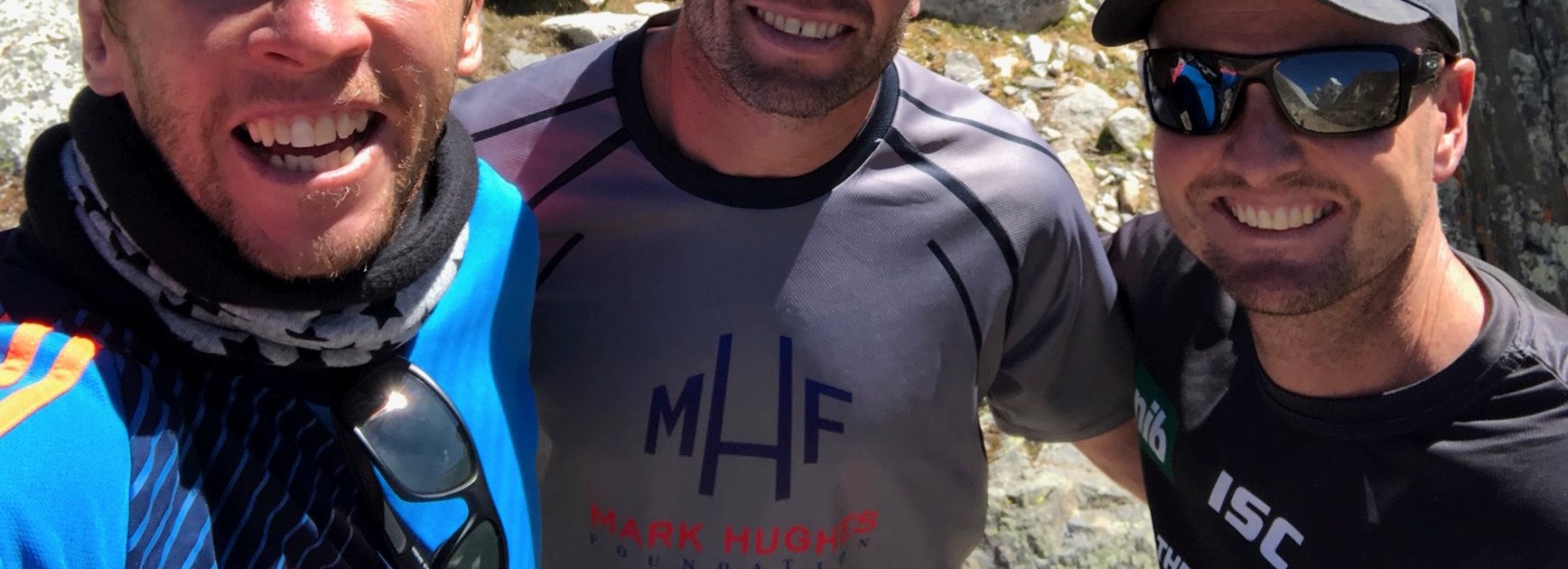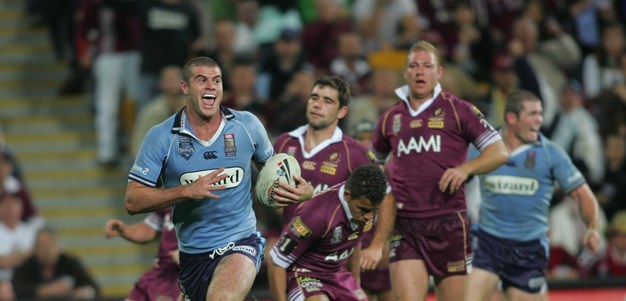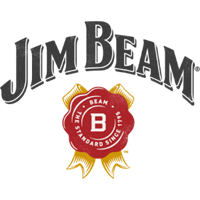
Weary-legged and doubts quickly spawning in his mind, NSW True Blue Danny Buderus is left to fear the worst soon becoming the inevitable.
It’s day eight of the nine-day trek on the world’s tallest mountain, and though the Everest Base Camp is just some 16 kilometres away – more than 100 kilometres of the trek behind them – reaching the ‘goal’ is the farthest thing from Buderus’ thoughts.
The unrelenting howl of a swirling breeze brings angst as much as it does a chill, as oxygen levels quickly drop amongst the group of 28.
Near on a dozen former NRL stars – Matt and Kurt Gidley, Matt Johns, Paul Harragon and Mark Hughes, amongst others at Buderus’ side – gather every ounce of will and want as the mood in the camp takes a turn for the worst.
“That’s when everything started to go a little bit pear-shaped in terms of our sickness and our health,” Buderus tells NSWRL.com.au.
“When you get to the heights that we were at, your oxygen in your blood should be around 80 to 85 per cent. Some guys had dropped to around 40, 45 per cent.
“Luckily for us there was a doctor on the trip who knew what was going on, he kept the situation under wraps and made sure no one was panicking.
“The sleep factor, the food, the toilets and all that sort of thing, they’re all something that can throw you out a bit. It’s all part of the challenge.”
But the ‘challenges’ – the shaking moments of the eighth day, and those faced across the nine days endured on the Everest trek – were quickly put into perspective by the learnings of the passing of dear friend, Matt Callander.
Callander, a long-term sufferer of brain cancer, was close in the hearts and minds of Buderus and his fellow trekkers – not least former Newcastle Knight, Mark Hughes.
Hughes and Callander had shared the unfortunate perils of the “horrendous” disease, as Buderus describes it.
Setting out to trek to Base Camp to raise awareness of the disease – and the necessity of increased research funding toward it – Buderus and his fellow former Rugby League icons pushed on, on the final day of the climb.
“All the guys that were on the trip, they’d played a big role in Mark’s football career. And that’s when you’d looked around the group, they’d been in a lot of battles with him on the field. Now we’re standing beside him in this battle with brain cancer,” Buderus says.
“We raised about $450,000 for the cause. Everyone was doing the climb each for their own reasons, but at the end of the day, we were all there together for the same cause, to raise awareness for a highly-important issue.
“The $100 million that got donated into research [in November], that was on the back of awareness. As much as the research funding is important, so too is the awareness of this cruel disease.
“There’s a lot of people out there suffering from brain cancer who are climbing bigger mountains than the one that we climbed.”
Standing at 30,000 feet above sea level, Everest’s challenge has brought undone more than 290 people, records say.
Determined to conquer the initial part of the mountain climb – as he did brain cancer, when deemed tumor free in March of 2016 – Hughes proved a source of inspiration to the men by his side, so too himself.
“To get 28 out of the 28 to Base Camp was a big achievement because it’s not easy once you’re 5,500 metres above sea level,” Hughes says.
“We worked as a team, stuck together and we got up there, but it’s so good to now be home.
“The 28 guys all paid their own way to be over there, and they all raised money through family, friends and businesses so it was a huge achievement.”
Side-by-side for each of the 120 kilometres of the trek – as they so famously were in Newcastle’s NRL premiership success of the 2001 season – Buderus and Hughes share a history and a friendship as detailed and decorated off the field, as the one that was seen on it.
Buoyed by Hughes’ fight to beat cancer, and his work done since to bring to light the severity of the disease, Buderus drew upon lessons learned during his time in the game to push through to the end of the climb.
“All the guys had their different ways of finding their own source of inspiration, [the families] were obviously worried about what was going on,” Buderus says.
“You had to be relentless. That’s one word that you hear tossed around in every dressing room, that was something we had to be every day.
“Being positive and happy, that’s infectious. That’s one of those things that everyone displayed. Not once did anyone say anything negative. We just got on with it.”
Learning more of himself, while also taking in the life experiences of those to his side, the trip was one that leaves the two-time Origin-series winning captain inspired to continue his efforts in aiding Hughes’ cause.
“There were 28 of us in the group, and there was a wide range of skills and abilities, we’d come together from different backgrounds,” Buderus says.
“I tried to drift up and down amongst the group, to hear people’s stories … everyone had a story.
“Every night we sat together and did our ‘highs and lows’, and there weren’t many lows because we were all appreciative of what we had.
“You realise how lucky we are, you see how easy it is to take everyday things for granted.”
The Mark Hughes Foundation (MHF) is a not-for-profit organisation formed in Newcastle by Mark and Kirralee Hughes following Marks diagnosis with Brain Cancer in 2013.
Mark is a well-known and highly respected former Newcastle Knights Rugby League player, business and community identity who is undergoing treatment to fight brain cancer.
The Mark Hughes Foundation has been formed to raise much needed funds to promote research, heighten awareness and support brain cancer patients (children and adults) and their families within the community.
Click here to donate to the Mark Hughes Foundation.




